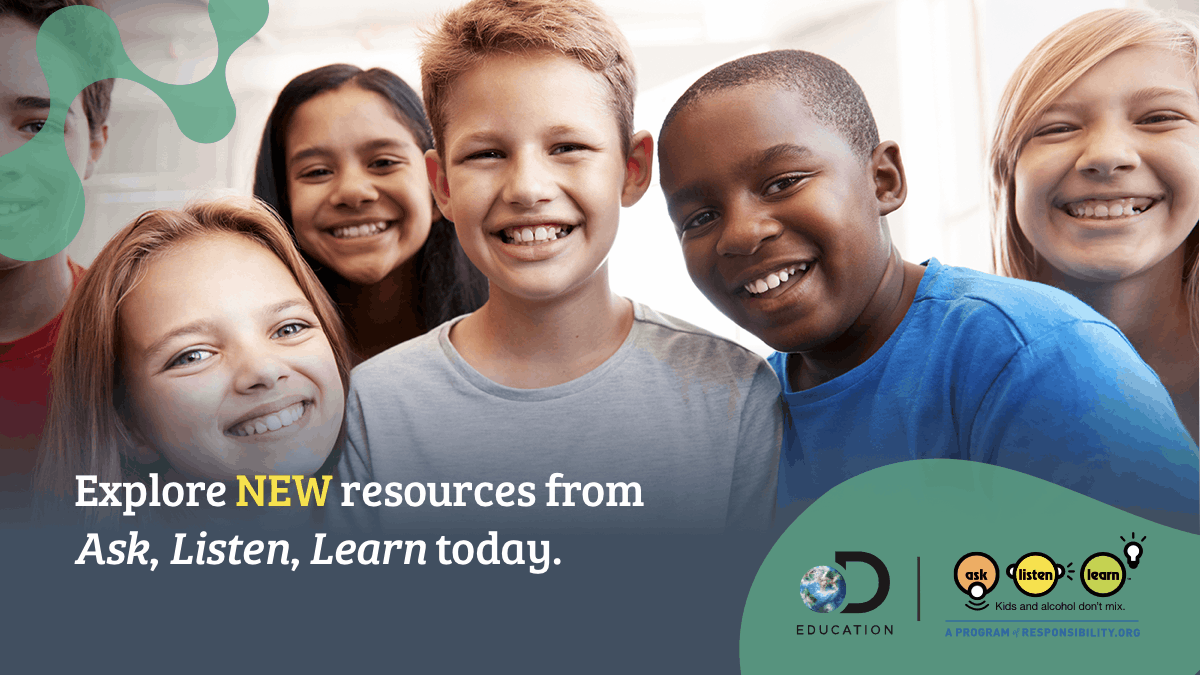Prevention Resources to Keep Kids Substance-Free
Helen Gaynor, Director of Educational Programs at Responsibility.org

We know kids don’t live in a vacuum and are faced with important decisions each day. That’s why Responsibility.org’s Ask, Listen, Learn: Kids and Alcohol Don’t Mix underage drinking prevention program and Discovery Education teamed up in 2018 to deliver award-winning prevention resources designed to spark conversations about alcohol, both in schools and at home, to prevent underage drinking. Now, we’re proud to release brand-new content that supports teachers, parents, and students in engaging in even more conversations to keep kids substance-free by addressing how underage cannabis use affects the developing brain.
Cannabis legalization is on the rise in many states: only in eight states and federally is the substance still fully illegal. Yet, as marijuana legislation becomes more common, any form of legalization is only for adults 21+. According to recent research by the Substance Abuse and Mental Health Services Administration (SAMHSA), 1-in-6 people who start using the substance before the age of 18 can become addicted.
To help address this issue, Ask, Listen, Learn in partnership with Discovery Education offers a new suite of science-based, no-cost resources focused on how cannabis affects the developing brain. Designed with the whole child in mind, these new resources focus on how kids interact with society and how society influences their behavior.
Bring this topic into the classroom with these three activities (appropriate for both asynchronous and synchronous learning):
-
Marijuana and Adolescent Health – Delve into the recommendations and reasoning behind minimum age requirements and the role of legalization by having students role-play as elected officials in a debate focused on the importance of health education in schools.
-
Marijuana and Your Brain – Separate cannabis facts from fiction by exploring the role of the developing brain’s endocannabinoid system and how its neurotransmitters are affected through creative writing.
-
How and Why to Say “NO” – Foster student collaboration around the short-term and long-term effects of cannabis on the developing brain with refusal and exit-strategy practice.
Educators can help students continue these conversations at home with resources designed specifically for families. As we know, parents are the #1 influence on a kid’s decision to drink – or not to drink – alcohol, so we developed resources to support parents and guardians when having conversations with kids about many risky behaviors:
-
When it Comes to Teens: What You Need to Know about Cannabis – Help families engage in meaningful discussions with kids to keep them substance-free and offer strategies to keep the lines of communication open.
Together, let’s equip students in grades 5-7 with the tools to say “YES” to a healthy lifestyle and “NO” to all risky behaviors. Informed students make better decisions.
Access program resources at DiscoverBrainBodyBehavior.com or through Discovery Education Experience’s Corporate Education Partnerships channel.
Explore even more content from Responsibility.org’s Ask, Listen, Learn: Kids and Alcohol Don’t Mix, whose mission is to eliminate underage drinking and keep kids alcohol- and cannabis-free.

